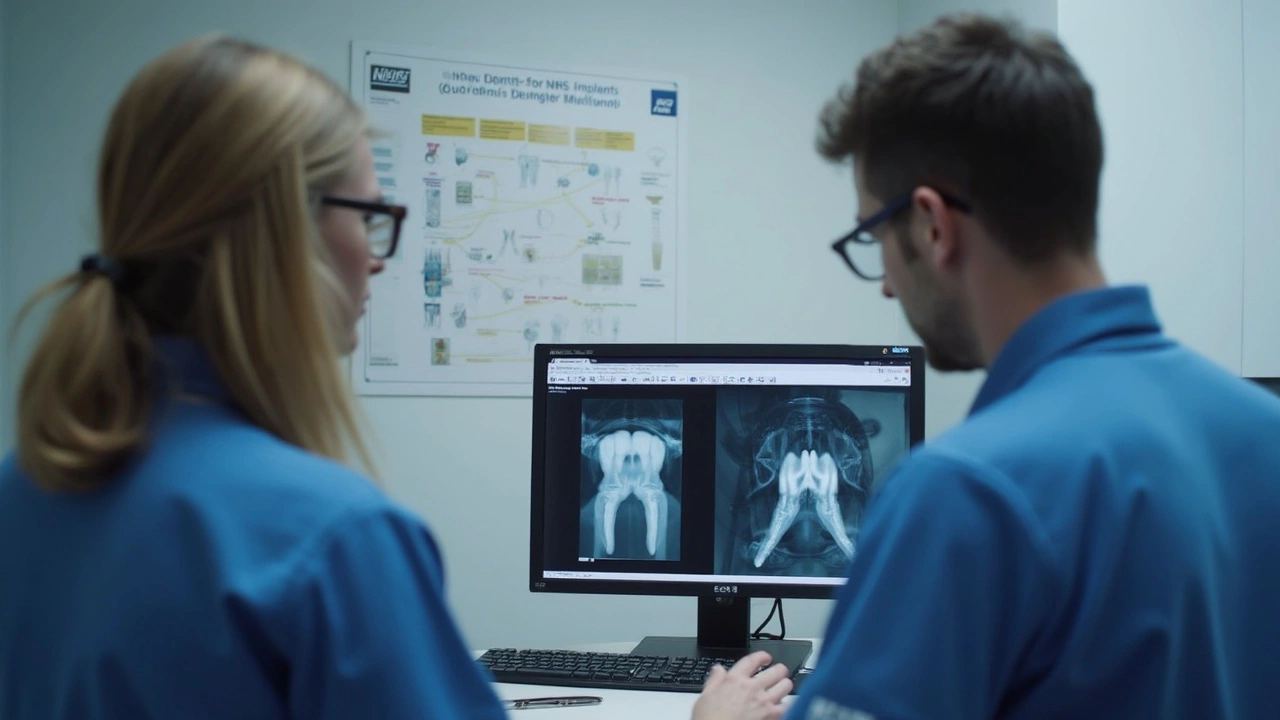Most people in the UK hope the NHS will foot the bill for dental implants, but there’s a catch—almost no one gets them for free. The NHS counts dental implants as a 'special case' kind of treatment. While they do pay for things like fillings and extractions, implants are seen as a cosmetic extra unless you’re facing a major medical problem.
If you’ve lost teeth in an accident, or have a condition that makes regular dentures impossible, there’s a tiny chance you’ll qualify. To get dental implants paid by the NHS, your dentist has to refer you for assessment, and a specialist panel decides if your case is severe enough. This process isn’t quick or simple, so be prepared for lots of paperwork and possible rejection.
- How NHS Dental Funding Works
- Who Can Get Dental Implants on the NHS?
- Common Reasons for NHS Refusal
- How to Apply and Improve Your Chances
- Alternative Options if the NHS Says No
- Key Takeaways and Helpful Tips
How NHS Dental Funding Works
The way NHS dental funding runs in England, Scotland, Wales, and Northern Ireland can feel like a maze. Most everyday dental treatments fall into clear price bands, but dental implants aren't on that regular list. The NHS breaks down dental care into bands (in England and Wales) or categories (in Scotland and Northern Ireland), and each comes with its own fixed cost. Want a filling or a root canal? You'll pay a set charge. Want a dental implant? That's almost always outside the standard menu, unless you’re in a rare situation.
Here’s a quick look at 2025 NHS dental charges in England for adults (these go up each April):
| Band | Treatments Covered | Cost |
|---|---|---|
| Band 1 | Exam, diagnosis, advice, X-rays, cleaning | £26.80 |
| Band 2 | All Band 1, plus fillings, root canals, extractions | £73.50 |
| Band 3 | All Band 1 + 2, plus crowns, dentures, bridges | £319.10 |
See dental implants missing from those bands? It’s because the NHS dental implants policy only funds them in exceptional situations—nearly always on strict medical grounds. If you just want a nicer smile, you’ll have to go private (and it isn’t cheap, trust me).
The NHS puts its funding for routine care first, then helps with more complicated stuff only if there’s a serious health reason. Kids, pregnant women, and low-income adults may get covered, but implants are a different story. For most folks, it comes down to what your local NHS dental team can offer, your medical records, and national guidance. So, don’t be surprised if NHS funding rules seem like boxes you just can’t tick for implants.
Who Can Get Dental Implants on the NHS?
If you’re hoping the NHS will sort out your missing tooth with an implant, you need to know it’s seriously restricted. The NHS almost never covers implants for routine tooth loss or for looks. The system is set up to offer NHS dental implants only if there’s a major need—think medical reasons, not just wanting a nicer smile.
Here’s when you might stand a chance:
- You’ve lost teeth because of trauma, like an accident, or after cancer treatment that’s left you struggling to chew or speak properly.
- You can’t wear dentures because of a medical problem, for example, a severely misshapen jaw, or you have an allergy to denture materials.
- Severe issues with your mouth or jaw—for example, people born with certain conditions (like cleft palate) sometimes qualify.
The bar is high, though. Cosmetic reasons, routine tooth loss, or problems with regular dentures usually don’t make the cut. Even if you do fit the bill, your own dentist can’t just decide you qualify. It has to go through a solid referral and review process. Here’s how the system plays out in real life:
| Reason | Chance of Approval (% Based on NHS Data) |
|---|---|
| Major trauma or cancer treatment | 40% |
| Medical allergy to dentures | 30% |
| Cleft palate or genetic jaw issues | 60% |
| Cosmetic/replacement for lost tooth (routine) | <5% |
NHS guidelines are strict, and funding is tight. If you’re struggling to eat, speak, or live well because of missing teeth and you have one of these serious issues, you can ask your dentist to refer you. But expect lots of questions, forms, assessments, and sometimes a long wait before you get an answer. It’s not a quick fix, and the decision can take a few months at least.
Common Reasons for NHS Refusal
Getting NHS dental implants isn’t just rare—it’s full of roadblocks. The main reason is the NHS puts implants in the ‘not essential’ category for most people. Implants usually get labeled as a cosmetic fix, so the panel expects a really good medical reason to say yes. Here’s where most people get turned down:
- Cosmetic reasons only: If you just want to improve your smile or feel more confident, the NHS will say no. This is the number one reason for refusal—implants aren’t seen as essential unless your day-to-day life is truly affected.
- Standard dentures are suitable: If you can still manage normal dentures, even if they’re not perfect, that counts against you. The NHS expects you to try dentures first.
- Minor tooth loss: Losing one or two teeth rarely qualifies, unless it seriously impacts eating, speaking, or causes major pain.
- Poor oral health or lifestyle issues: Smokers, people with gum disease, or those who struggle with dental hygiene are more likely to be refused, because implants have a lower chance of working.
- Not referred by a specialist: If you skip the referral process, your application won’t even reach the panel stage.
Some people also get knocked back if there isn’t a clear medical history or if they don’t follow the right steps. Here’s a quick table showing real numbers on NHS dental treatments from 2023, which may help you get a sense of the likelihood:
| Treatment | NHS Cases in 2023 |
|---|---|
| Fillings | Over 5 million |
| Dentures | About 700,000 |
| Implants | Less than 1,000 |
This table makes it clear: getting a green light for implants on the NHS is kind of like winning the lottery. If you don’t have a clear-cut medical reason, prepare for a firm ‘no’.

How to Apply and Improve Your Chances
Getting dental implants on the NHS isn’t like booking a regular check-up—you'll need to jump through some hoops, and it all starts with your NHS dentist. First, book an appointment and talk openly about your situation. Give them all the details on how missing teeth are affecting your daily life, eating, speaking, and even your mental health. This info matters because the NHS looks for evidence that your case is more than just about looks.
If your dentist thinks you have a shot, they’ll fill out a referral form and send you to a hospital or specialist NHS dental service for assessment. Here’s where it gets strict: the NHS is focused on medical need, not cosmetic reasons. They’ll check things like:
- Have you lost teeth as a result of trauma (like a serious accident)?
- Do you have a condition or illness making dentures impossible to use? (Think mouth cancer, jaw injuries, genetic disorders, or major facial deformities.)
- Are you allergic to normal dental materials or struggling with severe mouth pain because of regular dentures?
Bring supporting paperwork if you have it—hospital letters, a history of dental problems, or evidence from specialists. You want the panel reviewing your case to see how much your quality of life is suffering. Keep in mind, getting NHS dental implants approved is rare: the bar is super high, and sadly, most folks get turned down because they don’t fit strict guidelines.
Some tips to slightly boost your odds:
- Be thorough in your explanation to your dentist—mention how your diet, work, or mental well-being is affected.
- See if your GP or hospital specialist can send a support letter.
- If you have complex medical issues, ask your healthcare team to back up your case.
If you don’t meet the NHS criteria after the panel reviews your case, don’t beat yourself up—it happens to most people. But at least you’ll know you gave it your best shot with a proper application.
Alternative Options if the NHS Says No
If you’ve hit a dead end with the NHS and dental implants, you’re definitely not alone. More than 90% of people seeking implants in the UK end up paying privately because the NHS dental implants criteria are so strict. But don’t let that stop you—there are other ways to make treatment affordable or find something that works for your mouth and your wallet.
- Private Dental Clinics: This is the most common route. A single dental implant in the UK costs between £2,000 and £2,800, but prices can climb depending on complexity or location. Clinics sometimes offer payment plans to spread the cost out over a year or more, which can make things less painful financially.
- Dental Finance: Many clinics work with finance companies to let you pay monthly for treatment. Interest rates and terms vary, so always read the fine print and work out what you’ll really pay after any fees are added in.
- Dental Insurance with Implant Cover: Most basic dental insurance doesn’t touch implants. But some premium policies (often £30-£50 a month) do include partial or full coverage for major dental work. Read every little clause—most won’t pay out for 'pre-existing' missing teeth or won’t cover you in the first 6-12 months.
- Dental Schools: Some local dental hospitals or teaching schools let patients receive implant treatment performed by students (supervised, obviously) at a lower price. Spaces are limited, but if you’re selected, savings can be massive.
- Alternative Treatments: Modern dentures or bridges can sometimes do the trick at a fraction of the price. These might not have the same feel as an implant but are a lot more accessible both on the NHS and privately.
Here’s a table showing average costs for different tooth replacement options in the UK:
| Treatment | Typical Private Cost (per unit) |
|---|---|
| Single Dental Implant | £2,000-£2,800 |
| Dental Bridge | £350-£1,200 |
| Full Denture Set | £650-£2,000 |
A couple of tips: Always check if the quoted price includes everything (consultation, x-rays, surgical fees), not just the implant itself. And if you’re headed abroad for treatment, do your homework about clinic standards and aftercare—cheap up front can mean problems later on.
Key Takeaways and Helpful Tips
The big truth is this: the NHS almost never covers dental implants. Unless you’ve got clear medical needs—meaning you can’t eat or talk properly with regular dentures—the NHS will usually say no. Even if your case seems urgent to you, the bar for getting implants through NHS funding is extremely high.
- Save yourself time and talk honestly with your regular dentist first. They’ll know if you even have a tiny shot at NHS coverage for dental implants UK patients often ask about.
- If you get referred, keep every bit of paperwork: appointment notes, GP letters, even old dental X-rays. The specialist NHS panel wants solid proof—more evidence means a better chance.
- Don’t count on the NHS if you just want to avoid dentures or like the idea of implants. They’re strict about cosmetic reasons—they won’t pay just because you want a natural look.
- For most people, exploring private dental clinics or dental payment plans is more realistic. Some clinics offer 0% financing or spread-out payment deals for implant work.
- Charity programs for dental help are rare but worth looking up if you’re really struggling—especially if you’re a cancer survivor, have had facial trauma, or live with long-term health issues.
One last thing: NHS lists and policies can change without much warning. Always double-check what’s actually covered and ask for up-to-date guidance before investing time, money, or hope. Staying realistic about your options will save you a ton of stress.





